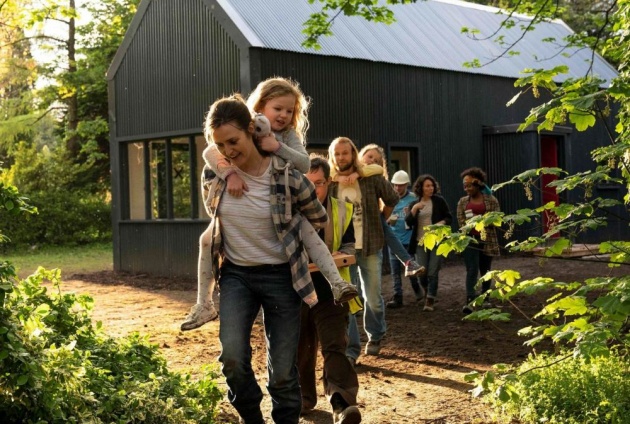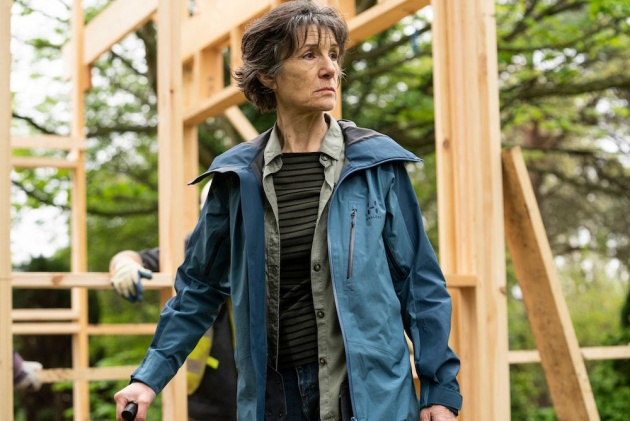
Pictured: Sandra (Clare Dunne) gives her daughter a piggy back ride past her home under construction in the Irish drama, 'Herself', a film written by Dunne and Malcolm Campbell and directed by Phyllida Lloyd. Still courtesy of PictureHouse Enterainment / Cornerhouse Films
No one is sure how long Covid-19 will disrupt cinema exhibition around the world. At the start of September 2020, the UK release of Herself, a drama about a single mother who is driven to build her own home, was set for 16 October by Picturehouse Entertainment. By the beginning of October, the CEO of parent company, Cineworld, Moshe Greidinger, decided to close all his cinemas in the UK – Cineworlds and Picturehouses - ‘temporarily’ from 9 October, motivated by the decision to postpone the release of the James Bond film, No Time To Die, a second time to April 2021. With that decision, the release of Herself is in limbo. Without blockbusters, large cinema chains are considered unviable. Other chains in the UK – Vue, Odeon and Showcase – continue to stay open, though not always seven days a week. Independent cinemas are attracting an audience often showing movies that the major chains have rejected, for example On the Rocks and The Trial of the Chicago 7. The major chains insist that the fourteen-week theatrical window is necessary to guarantee people through the door. This window means that, in the UK, a film may not be shown on any medium other than a cinema for that three-and-a-half-month period. But the success of On the Rocks in independent cinemas proves that people like to watch films in cinemas rather than on streaming services a few weeks later. Even socially distanced, cinemagoing is still a communal experience.
Herself, directed by Phyllida Lloyd, is a powerful and uplifting film that celebrates the best in human nature. Its hero, Sandra (Clare Dunne, who wrote the original script, finessed by co-writer Malcolm Campbell) is assisted by people who understand that broken systems aren’t going to fix themselves. The film resonates in a week that the British Government decided not to finance free meals for school children during the half-term holiday. Not waiting for the system to fix itself, local authorities and businesses offered free meals for the children of the most vulnerable in society. Such acts of generosity are comparatively rare on a wide scale, but there is a groundswell of distrust in a government that promised much but squandered millions if not billions in failing track and trace systems, a much delayed phone app and gave advice to the public that engendered false hope that the Coronavirus outbreak was manageable. Mostly, it is the large payments to companies that fail to deliver that leaves the most bitter aftertaste.
Herself deals with two contrasting social ills: a justice system that gives the perpetrators of domestic violence the same rights as their victims, especially with regards to parental custody, and the scant availability of affordable housing. Herself is set in Dublin not the United Kingdom, but the problem is the same. Too much state money is spent paying landlords in rent supplement or the equivalent and there are not enough schemes to increase home ownership. In the UK, the Conservative Government headed by Margaret Thatcher gave council tenants the right to buy their rented homes; society transitioned from a rental economy to home ownership. However, within thirty years, the cost of buying a home was placed out of reach of the individual, even young couples. They needed to accumulate savings equivalent to ten per cent of the property value, but with rents being so high, opportunities to save are limited. The result is that more young people are living with their parents instead of making their own way. Only children from wealthy families can get an early foot on the ladder. The answer to this problem – rent control – is not considered since it is deemed as interference in the market. In the UK, ‘market forces’ are considered sacred by both current and past Conservative Governments.
At the start of the film, we see Sandra in a relative idyll. Her two daughters, Emma (Ruby Rose O’Hara) and Molly (Molly McCann) are applying make up to her face. They go through a familiar routine. ‘Why have you got a birthmark on your face?’ one daughter asks, referring to the darkened skin under Sandra’s left eye. ‘Because God said, ‘there are plenty of Sandras in the world. I put it there to recognise you.’ The girls’ giggling and dancing round the room is short-lived. Sandra’s husband, Gary (Ian Lloyd Anderson) is home. He is angry. ‘What’s this money I found in the car? You planning your escape?’ Sandra cries out, ‘Black Widow’. This is a protocol whereby the two daughters leave the room, the youngest, Molly, hides in a doll’s house, the eldest, Emma, runs with her lunchbox to the nearest shop, up to the storekeeper. Inside, there is a note: call the police, my mum is being attacked. Gary’s blows are unequivocal, injuring Sandra’s wrist. In the next scene, the family moves into an airport hotel – they are not allowed to take the guest elevator, but instead must climb the emergency stairs, never mind the shopping. Sandra has two jobs, as cleaner for a doctor, Peggy (Harriet Walter), who injured her hip in Africa (‘not in Marks and Spencer’, she reminds Sandra sternly) and in a pub, where the staff look on as Sandra vigorously wipes tables. The landlord (Art Kearns) instructs her to clean up the mess in the men’s bathroom ‘left over from last night’ with an almost malevolent glee. There is a tradition of male employers resenting having to hire others; they least they can do is belittle them. Still, Sandra keeps her spirits up. The children play in the hotel car park. The promise of chips (that is, French fries) lights up their young faces. Sandra continues to bring the two girls for weekend visits to their father, but Molly is petrified of him. There are short, sudden flashbacks to the attack: Molly saw. None of her father’s promises of ‘eggy bread’ can fix that, even though on the first visit, Gary bought them shoes.

Pictured: Missing eggy bread: Sandra (Clare Dunne) with your youngest daughter Molly (Molly McCann) in the drama, 'Herself' written by Clare Dunne and Malcolm Campbell and directed by Phyllida Lloyd. Still courtesy of Picturehouse Entertainment / Cornerhouse Films
A council official, Jo (Cathy Belton) provides kindly but firm support to the family. She’s a little scatty and shifts tone three times in a short exchange, once for the children, once for herself and once (firm) for Sandra. There isn’t much by the way of affordable housing available to Sandra. A showing of one house prompts a long queue. ‘I don’t know why we bother,’ says the woman behind Sandra. The young council official, having awarded keys to another couple, shakes her head at those who are waiting. Whilst searching the internet, Sandra learns of a house that can be built for 35,000 Euro (approximately one-tenth the cost of an actual two-bedroom property). Having done her sums, she goes to the council, requesting a loan to build one, explaining that she has located available land and undertakes to both repay the loan and pay rent, saving the council thousands. The official exercises her ‘no, can’t help you’ voice. However, Peggy has learnt of her plan – Sandra conducted one of her searches on Peggy’s computer. (‘I didn’t mean for you to see that.’ Sandra says sheepishly. ‘Well, I did,’ replies Peggy.) Peggy offers to give Sandra the use of her back garden to build her house and to loan her the money. Sandra’s late mother also worked for Peggy. She was ‘more than a cleaner – a friend’.
This act of generosity doesn’t go down well with Peggy’s adult daughter but sets Sandra on her way. She has a list of things to buy from a builder’s merchant, but the man behind her counter doesn’t treat her as a serious customer, instead wanting to serve the man behind her. He is Aido (Conleth Hill), a brusque fifty-something builder with a weak heart and an adult son with Down’s Syndrome. Aido chides the shop assistant for his bad manners. Sandra follows him to the car. ‘You don’t know me, but you worked with my husband,’ she remarks (one of the script’s contrivances, but we’ll let it go). Reluctantly, he appraises her plans. Sandra will need someone who knows what they are doing, but it isn’t him. Visiting his yard, Sandra persuades him to help. Aido knows Gary’s family and is sympathetic. (There is the inference that behaviour breeds behaviour; that Gary learnt to be a wife-beater by watching his mother suffer in silence.) Aido’s son gives Sandra a set of size six boots.
Work starts at weekends. It becomes apparent that Aido and Sandra can’t do this on their own. Sandra recruits the barmaid, who lives in a squat and she brings people with her. Molly and Emma are told to stay in their own area, as ‘command and control’. They play with a cardboard house whilst Sandra and the others lay the foundations for a real one. However, Molly’s fear of her father prompts her to stay in the car. She misses visits. Then there’s an accident on the site, which prompts Gary to go for full custody.

Pictured: 'Wear earplugs.' Peggy (Harriet Walter) on a building site at the bottom of the garden having castigated a grumpy neighbour in the film, 'Herself', written by Clare Dunne and Malcolm Campbell and directed by Phyllida Lloyd. Still courtesy of Picturehouse Entertainment / Cornerhouse Films
As a writer, Dunne represents Gary’s position fairly. It is entirely credible that he wouldn’t see himself as an abuser. He breaks the restraining order and brings food to the airport hotel. For him, Sandra should just get in his car with the girls and come back to live with his parents. Gary is shamed by his father, who doesn’t want the neighbourhood to know his son’s troubles. Gary insists he is getting counselling. However, Sandra cannot trust him. She knows his temper all too well. Nevertheless, she misses him, specifically the man he was before, at their wedding. At one point, via Emma, Gary sends a photograph of them both together in happier times.
Sandra makes her daughters swear not to tell anyone about the house being built. She won’t even let her friend from the pub take a photo. (‘I thought you wanted to document it,’ the friend pleads, citing the TV programme Grand Designs.) However, this lie proves her undoing, making her appear to be an unfit mother. Sandra lied on a form about her housing options and this makes Jo cross. However, Sandra has Peggy in her corner, who insists that she is a ‘good woman’.
The film suggests that abusers cannot let go, that they would rather attack their spouses than confront their own behaviour. Is this a fair conclusion? A random search of the internet refers to Lenore Walker’s publication, ‘The Battered Woman’, in which she defines a cycle of domestic violence. This begins with a tension-building phase, followed by acute violence, then the reconciliation ‘honeymoon’ phase before tension builds again, with abusers continuing to exercise coercive control, eroding their victim’s self of self-worth. The abusers justify the violence by the calm that follows, frequently showering their victim with presents and compliments, and blame the victim for eliciting violence. The only effective way to end domestic violence is for the perpetrator to take responsibility for their actions, and not excuse them. In Herself, Gary never properly owns his problem.
The film celebrates Sandra’s resilience, her willingness to ask for and accept help. Ultimately, so long as people behave dishonestly and don’t recognise the unnaturalness of domestic violence, it will continue. The abusers should be treated like alcoholics or drug addicts. They should be forced to accept responsibility for their choices and seek routes out of them.
Reviewed at Picturehouse Central, Screen Two, Thursday 10 September 2020, 10:00am (press screening); Crouch End Picturehouse Screen One, Thursday 8 October 2020, 19:30, London Film Festival screening



